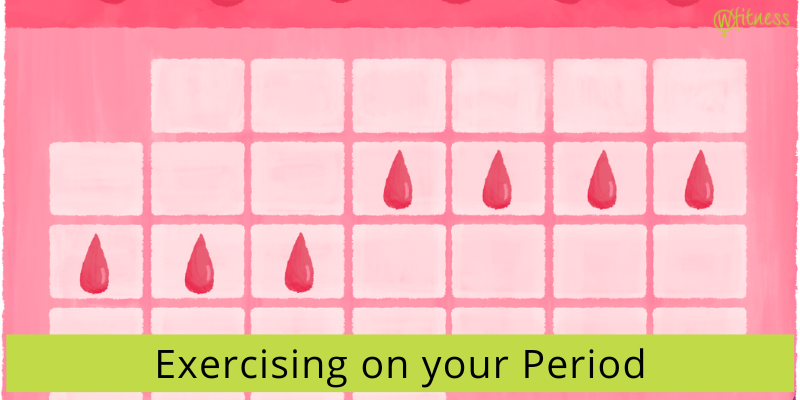Sometimes overlooked, but it’s important to discuss the taboo subject of PERIODS and their effect on exercising. From simply feeling more fatigued and low on energy, to excruciating cramps for some ladies, your period can affect your training regime, so you need to know what’s right for you.
Jazmin Swyers, a British long jumper, withdrew from the Boston Long Jump in 2017 because of intense pain whilst on her period. She tweeted ‘we discuss injuries and illnesses openly, but this (getting your period) is something we don’t talk about, and I wanted to put it out there because I’m sure there are other young athletes dealing with it’. In 2016 at the Rio Olympics, she was in agony with period pain but left it too late to see the doctor because she was embarrassed.
England’s Dina Asher-Smith was forced to withdraw from the 2022 Commonwealth Games after suffering from cramps in both calves, related to having her period (stomach cramps can spread to other parts of the body including the legs).
Paula Radcliffe held the world record for the women’s marathon (with a time of 2:15:25) running at the start of her period. She said afterwards that she didn’t feel as comfortable as she could have done.
So, why is so little known about the effects of exercising during your period? Why is menstruation such a taboo subject?
Luckily, more female athletes, including Paula Radcliffe, are calling for more studies to be carried out on the ‘impact of the menstrual cycle on sporting performance’. Even slight PMS symptoms can be disruptive to an athlete’s training or during competitions when training at such a high, intensive level. Women are struggling because this is such a taboo subject that is not openly discussed or researched. There is very little research out there which is astonishing given that 50% of the UK population is female!
How does your period affect your workout/training?
Your body mass may be higher than normal due to fluid retention, you may have stomach cramps, back pain, nausea, bloating, joint pain, headaches and tiredness, as well as low mood or mood swings due to the fluctuation in hormones. You may also suffer from low energy and have less motivation than normal. You might experience none, some, or all the above. Everyone has a different experience as no two women are the same. Some women will have very little or no symptoms at all, whilst others have symptoms that are so severe, they have to miss a day’s work, their workout or, for athletes, important training or events.
How do you feel about exercising when you have your period?
- Do you feel that it affects your workout?
- Do you not want to exercise whilst on your period?
- Do you always miss a week of workouts every month?
Let us reassure you that, if you feel well enough, exercising whilst you have your period can be beneficial, for both your physical and mental health. Now, I bet you’re thinking that with the training that athletes do, they wouldn’t suffer with any pms symptoms, if exercising is beneficial. Whilst exercising can lessen pms symptoms, if you are an athlete, then the change in hormone levels during your period can affect your performance. For runners this can be particularly difficult as changes to the body include an increase in body temperature and breathing. Increased temperature means that you don’t start sweating until you have reached a higher body temperature. Increased breathing means there is less oxygen available for your muscles – this is needed as your muscles work much harder during exercise, increasing the need for oxygen.
How can exercise can help at that time of the month:
- Carrying on with your normal workout routine (which can easily be adapted, if needed) can help to ease menstrual cramps, tiredness, backache and headaches. This is because endorphins, released when exercising, act as a natural painkiller, reducing your awareness of pain.
- Exercising in the days leading up to your period can also help to lessen tiredness and mood swings due to fluctuating estrogen levels.
- You probably feel tired and have less energy but avoiding exercise at this time won’t make you feel better or save those energy stores, in fact, exercise can give you an energy boost as well as reducing tiredness.
- Exercise will improve your mood. Exercise increases circulation, releasing those endorphins and giving you a workout ‘high’.
- Research has shown that exercising at the beginning of your period (from the first day) can help you to increase your strength and power due to the drop in levels of female hormones.
- Drinking plenty of water throughout your period can also help to reduce symptoms as women become dehydrated at this time. It is quite normal to be thirstier as the body needs more water during your period. Make sure to have hydrating snacks rather than the crisps and chocolate we crave as these can increase the risk of dehydration 😊
So, to conclude, if you can exercise through your workouts, this could help to ease your symptoms and increase your energy, however, the slightest pms symptoms can impact your performance, so maybe don’t aim for any PB’s at this time unless you feel able to. This will not affect everyone and depends on the individual, your symptoms and whether you are taking any medication. Some research has been done on this subject and more is being understood but much more research is needed.
If you need extra support exercising during your period, take a look at our women’s only gym, W Fitness, where we provide a safe, friendly environment for women to work out with a personal programme (that can be adapted if needed), providing sanitary and personal hygiene products.
Much Love
Caroline & Hannah xx
